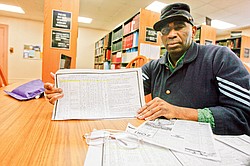Black History Monday: Youngstown brothers, Buffalo Soldiers
Steffon Jones did research and discovered the only two (at least the only two he can find) Buffalo Soldiers from Youngstown.
A local historian says those looking for unique perspectives in black history can start with the story of two Youngstown brothers who served their country as Buffalo Soldiers.
Several black military regiments were raised during the Civil War to fight alongside the Union Army, including the 54th Massachusetts Volunteer Infantry and the many United States Colored Troops Regiments.
The Buffalo Soldiers, however, were established by Congress as the first peacetime, all-black regiments in the regular Army.
By many accounts, the black soldiers’ combat prowess, bravery, tenaciousness — and appearance on the battlefield — inspired American Indians to call them “Buffalo Soldiers,” a term embraced by the black fighting men.
Steffon W. Jones, local historian, said Buffalo Soldier ties to the Youngstown area were discovered by chance.
Jones was doing research on the Boggess family, an early black family in the city, when he stumbled upon the story of Jesse and James Boggess.
“I had Jesse’s death certificate from a Dayton library and it said he was a soldier, but then it said he was a Civil War soldier. I said to myself that couldn’t be right because Jesse was born in 1870 and that is five years after the Civil War ended,” Jones said.
He continued digging into the lives of the Boggess brothers and found that they actually served as Buffalo Soldiers at various times between 1888 and 1896. Jones said he could find no other record of anyone from the Youngstown area serving in the ranks of the Buffalo Soldiers.
“This is history for Youngstown. The Buffalo Soldiers were a big deal in the West, and to have two come from this area is a really big deal,” Jones said.
Jones is continuing to dig for information on Jesse and James Boggess, but to date not a lot is known about the two men.
According to Jones’ research, Jesse Boggess, after serving in the military, became a tinsmith and moved to the Cleveland area, but did not marry or have any children. He ultimately fell in a Dayton restaurant and died from a head injury in 1935.
James Boggess, Jones said, became a carpenter and moved to Dayton. He also, according to Jones, did not marry or have any children. He died of pneumonia in 1945.
Any person having served in the ranks of the Buffalo Soldiers, Jones said, is worth recognizing and remembering for their bravery in contributions to surveying the West.
“They almost always sent the black soldiers in to survey. It was assumed that the white soldiers were better so they sent the black soldiers,” Jones said while discussing the dangers faced by the early surveyors of the West, including dealing with Indians and cutting trails through rugged land.
“After they surveyed the land and did that work, people moved in.”
According to Jones, the Jesse and James Boggess story adds another chapter to the story of a Youngstown family with a rich history including seven Civil War soldiers, two World War II soldiers, several World War I soldiers and three Buffalo Soldiers.
A cousin, David Boggess from Pennsylvania, also served in the Buffalo soldier ranks with Jesse and James.
“I think it is important to know that there were Buffalo Soldiers to come out of your area,” Jones said. “Knowing these two men served their country in the West should give the area a sense of pride. That is the significance of this.”
The Boggess family has received recognition locally in the past.
Oscar D. Boggess was honored by city leaders and members of the Boggess Street Committee with a historical marker at the corner of Hawthorne and Edwards streets on the city’s South Side in 2006. Boggess, a brother to Jesse and James’ father, Richard, lived on Edwards Street at one time.
Oscar Boggess was one of the first black pioneers to be honored as a resident of the city and Mahoning County, as well as being one of many acknowledged black Civil War soldiers. He also was co-founder of a now historic black church in the city.
jgoodwin@vindy.com
 43
43

